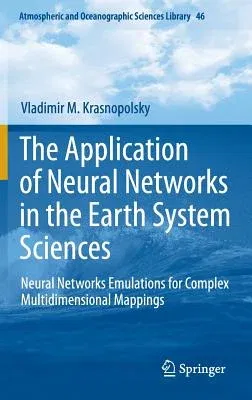This book brings together a representative set of Earth System Science
(ESS) applications of the neural network (NN) technique. It examines a
progression of atmospheric and oceanic problems, which, from the
mathematical point of view, can be formulated as complex,
multidimensional, and nonlinear mappings. It is shown that these
problems can be solved utilizing a particular type of NN - the
multilayer perceptron (MLP). This type of NN applications covers the
majority of NN applications developed in ESSs such as meteorology,
oceanography, atmospheric and oceanic satellite remote sensing,
numerical weather prediction, and climate studies. The major properties
of the mappings and MLP NNs are formulated and discussed. Also, the book
presents basic background for each introduced application and provides
an extensive set of references.
"This is an excellent book to learn how to apply artificial neural
network methods to earth system sciences. The author, Dr. Vladimir
Krasnopolsky, is a universally recognized master in this field. With his
vast knowledge and experience, he carefully guides the reader through a
broad variety of problems found in the earth system sciences where
neural network methods can be applied fruitfully. (...) The broad range
of topics covered in this book ensures that researchers/graduate
students from many fields (...) will find it an invaluable guide to
neural network methods." (Prof. William W. Hsieh, University of British
Columbia, Vancouver, Canada)
"Vladimir Krasnopolsky has been the "founding father" of applying
computation intelligence methods to environmental science; (...) Dr.
Krasnopolsky has created a masterful exposition of a young, yet maturing
field that promises to advance a deeper understanding of best modeling
practices in environmental science." (Dr. Sue Ellen Haupt, National
Center for Atmospheric Research, Boulder, USA)
"Vladimir Krasnopolsky has written an important and wonderful book on
applications of neural networks to replace complex and expensive
computational algorithms within Earth System Science models. He is
uniquely qualified to write this book, since he has been a true pioneer
with regard to many of these applications. (...) Many other examples of
creative emulations will inspire not just readers interested in the
Earth Sciences, but any other modeling practitioner (...) to address
both theoretical and practical complex problems that may (or will!)
arise in a complex system." " (Prof. Eugenia Kalnay, University of
Maryland, USA)

